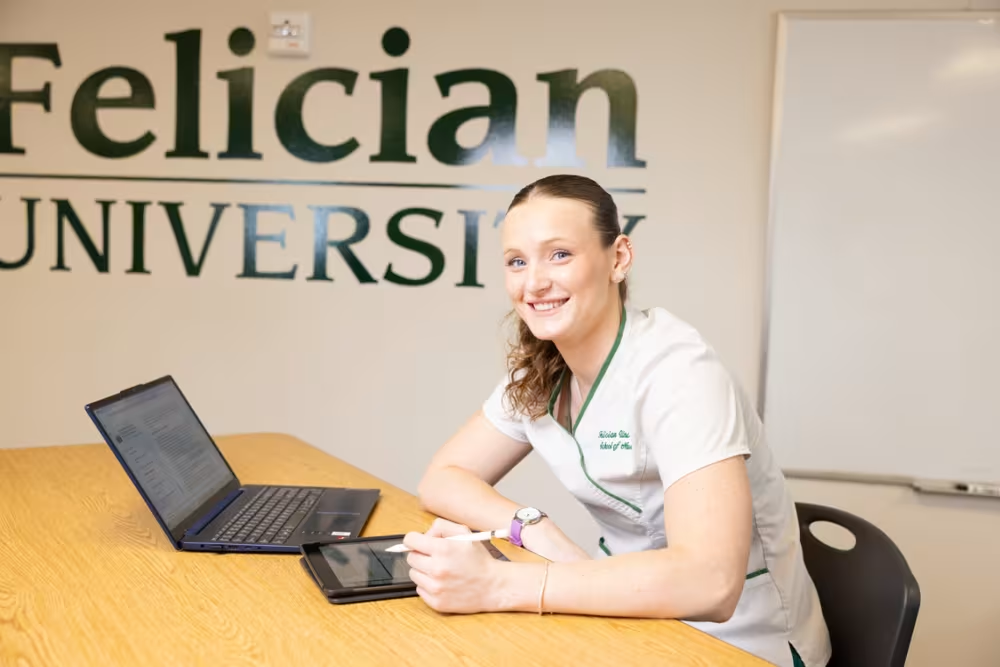How to Pass the NCLEX-RN: Your Ultimate Guide to Success
Each blog post is dated and contains accurate information as of that date. Certain information may have changed since the blog post publication date. If you would like to confirm the current accuracy of blog information, please visit our ABSN overview page or contact admissions at (844) 347-2497.
When you finish nursing school, you may wonder how to pass the NCLEX-RN. Explore the format, types of questions, effective study strategies, next steps, and tips for quickly passing the NCLEX-RN, the comprehensive registered nurse licensure test.

When you have finished nursing school, you must take the NCLEX-RN before beginning your exciting new career as a nurse. The NCLEX-RN is a comprehensive exam that determines if you are ready to become a nurse. Passing this exam allows you to get a job in the nursing workforce.
You will probably wonder about how to pass the NCLEX-RN, how it works, and how to study for it. Although this exam is challenging, you can prepare and greatly improve your chances of passing.
Felician University’s Accelerated Bachelor of Science in Nursing (ABSN) program will prepare you for this exam and professional nursing practice. With on-ground and hybrid programs, you will learn all the information you need to enter the healthcare industry as a practice-ready nurse.
You will also receive fundamental skills and simulation training in our state-of-the-art nursing labs. To gain real-world exposure, you will work in clinical settings during your clinical rotations. You will draw on all of this to successfully pass the exam.
Understanding the NCLEX-RN Exam Format
There are two primary types of NCLEX exams: the NCLEX-PN and the NCLEX-RN. The NCLEX-PN focuses on licensing practical or vocational nurses. The NCLEX-RN focuses on licensing registered nurses. Felician University’s ABSN program prepares students to pass the NCLEX-RN, which has the following characteristics.
Computer Adaptive Testing Explained
The NCLEX-RN uses Computerized Adaptive Testing (CAT), which asks you questions of varying degrees of difficulty based on your prior responses. The computer aims to ask questions that you should have a 50% chance of answering correctly. This software gauges your progress along the way. As soon as you have correctly answered enough questions to pass with a 95% confidence interval, your exam will finish.
Alternatively, depending on the number of questions you answer correctly, the exam will continue until you run out of questions or time, at which point the computer will calculate whether you have passed or failed.

See more about earning a BSN through an online nursing education.
Types of Questions on the Exam
Multiple-choice questions make up most of the NCLEX-RN. You might also experience questions like:
- Labeling a diagram or photo of an injection location or assessment area
- Drag and drop information in the proper order
- Select-all-that-apply questions from scenarios
- Fill in the blank with the correct answer after solving a problem
How to Pass the NCLEX-RN: Start With a Solid Study Plan
When considering how to pass the NCLEX-RN, you should make a realistic study schedule. Blocking out chunks of time to review material, do flashcards, or answer practice questions. Writing down a detailed schedule will increase accountability and help you know exactly what you need to do each day to stay on track.
Be sure you choose the correct NCLEX-RN prep materials, including practice questions, flashcards, and review books. Felician ABSN can help you identify the materials needed. These will help prepare you confidently for your NCLEX-RN exam date.
Setting Goals for Passing the NCLEX-RN
You should set short-term goals. This will help you stay motivated as you study and meet those goals. For example, one goal could be to practice labeling a diagram until you are confident. Once you complete this goal, you will have increased confidence because you will feel accomplished.
You should also set long-term goals. These will keep you accountable for learning all the necessary material by the time you take the NCLEX-RN. For example, you could focus on foundations in the first two months of studying, specialty areas in the next two months or studying, and practice exams in the next two months.
NCLEX-RN Tips for Effective Studying
Practice questions are one of the best ways to effectively study for the NCLEX-RN. You should try to complete as many practice questions as you can before taking the exam.
Even though you might have to pay to access practice questions, it will be well worth it. There are many types of companies that offer access to practice questions, but the most common ones are Kaplan, UWorld, and Mometrix.
In addition to answering practice questions, it is vital for your preparation to also practice with the exact NCLEX-RN structure. You should aim to take more than one full-length practice exam. During this practice exam, try to mimic what your official testing environment will be like by using a time limit, practicing in a quiet space, sitting at a desk, and taking breaks to eat and drink.
Focus on taking these exams during the final month or two of your NCLEX-RN preparation, when you’ll get the most out of the mock exam. Then, after each practice exam, review the questions thoroughly and tailor future studying to the areas where you struggled most.

Passing NCLEX-RN with the Right Mindset
After reading about the seriousness of how to pass the NCLEX-RN, you may feel anxious about your abilities. However, if you prepare adequately, you will not need to be anxious. You can do this by engaging in instruction during your nursing program, joining study groups, and learning from online resources. If you do these, you will feel more prepared and less anxious about your test.
Remember that you’ll need to be mentally, physically, and emotionally well to succeed. Set aside time for yourself. Keeping your body healthy will dramatically improve your test scores. You can achieve this by exercising regularly, eating a healthy diet, and getting enough sleep. Most importantly, you must maintain a good balance in all areas of your life because it is key to preventing burnout and remaining mentally strong on exam day.
How to Pass the NCLEX-RN on Your First Try
You may be wondering how to pass the NCLEX-RN on your first try. If so, you can do these things to avoid these common mistakes:
- Read each question carefully to avoid missing words, important concepts, or essential information.
- Go with your first instinct and do not overthink the questions and answers.
- Understand the concepts instead of focusing on memorization of facts.
- Use time management skills to plan enough time for each question to be thoroughly considered and answered correctly.
During the exam, remain calm by taking a few deep breaths when stressed. You will also want to pace yourself by being aware of the clock and moving through each question in a timely manner. You do not want to take too long to answer just one question.
If you do not know the answer, do not panic. The answer may come to you later. If it does not, try your best to answer the question using your background knowledge about the subject.
NCLEX-RN Tips for Test Day Success
What should you do to successfully pass the NCLEX-RN on the day you are taking it? You will want to wear comfortable clothes and bring a few necessities with you to the testing site, including water, a photo ID, and your Authorization to Test document. You will not be allowed to have personal devices like a phone. Remember to remain calm and focused throughout the exam.
Last Minute Review Strategies for Testing Day
On the day, you can do a few last-minute review strategies. These include:
- Practice your weak subject areas first
- Teach the material to someone else
- Draw key concepts, diagrams, or problems
- Identify key information from each subject section
After the Exam, What Happens Next?
You finished the NCLEX-RN! You may wonder how you know if you passed the exam. Your official results will be sent to you within six weeks of taking the exam. However, you can receive quick results, which are typically available two business days after taking the exam. These unofficial quick results do not allow you to practice as a licensed and registered nurse, but they do allow you to see your score to determine if you passed or failed.
If you pass on your first attempt, congratulations! You can now receive your official license and start searching for a job. If you do fail your first attempt, you should inform your state’s board of nursing that you will need a retake, begin your study process again, and schedule your retake.

What can you do after you pass your NCLEX-RN? Explore top nursing careers and opportunities.
Final Thoughts on Passing NCLEX-RN
Even though the NCLEX-RN is a comprehensive exam, you can do well if you adequately prepare and study. If you do your best in all your coursework, studying, and preparation, you will succeed and complete the next step to become a registered nurse.
Prepare for the NCLEX-RN at Felician University
If you want to be well prepared for your NCLEX-RN, enroll in Felician University’s ABSN program. In the ABSN program, you will experience engaging in coursework, practical skills and simulation labs, and valuable clinical rotations. Reach out today to a counselor at Felician University.
